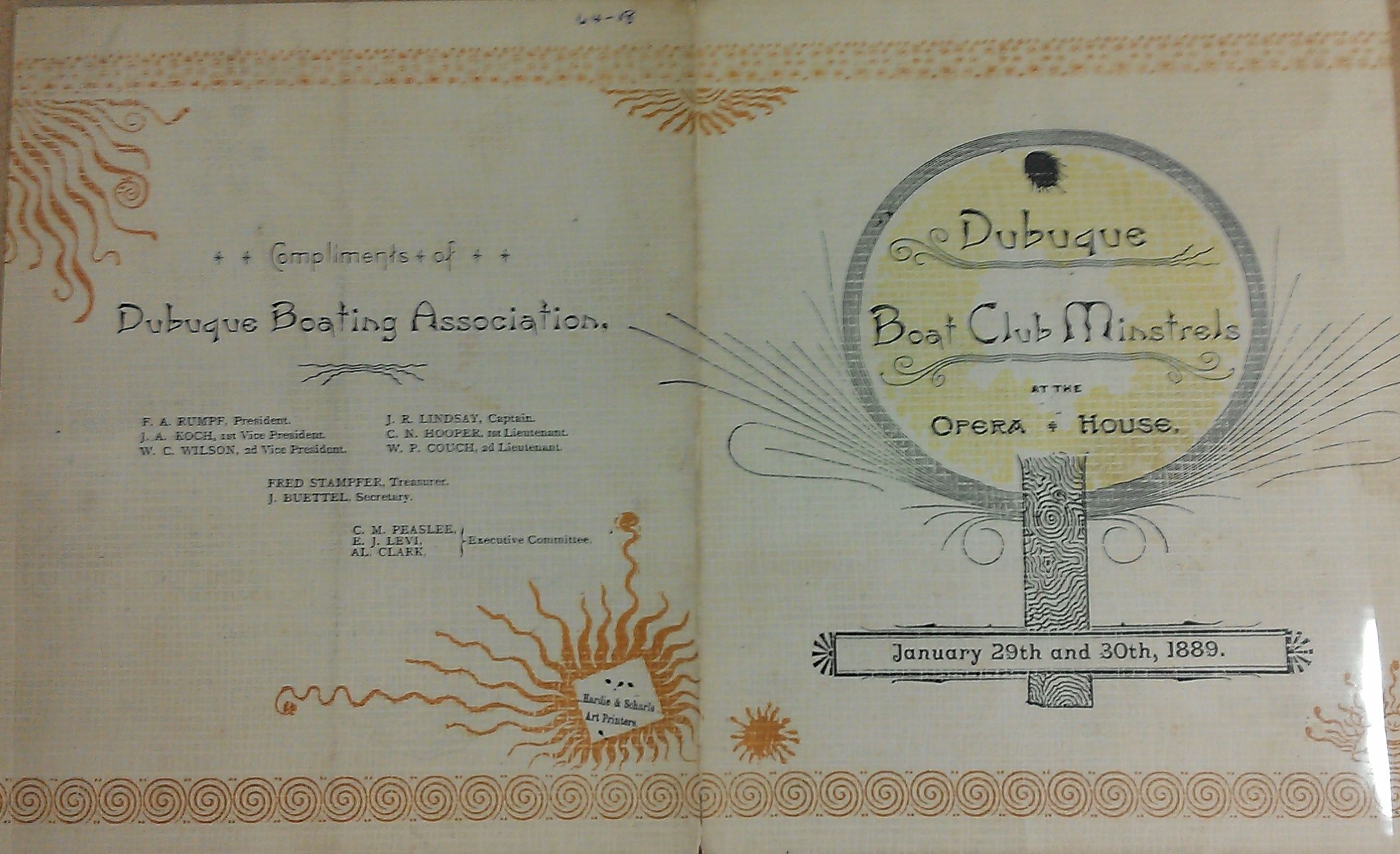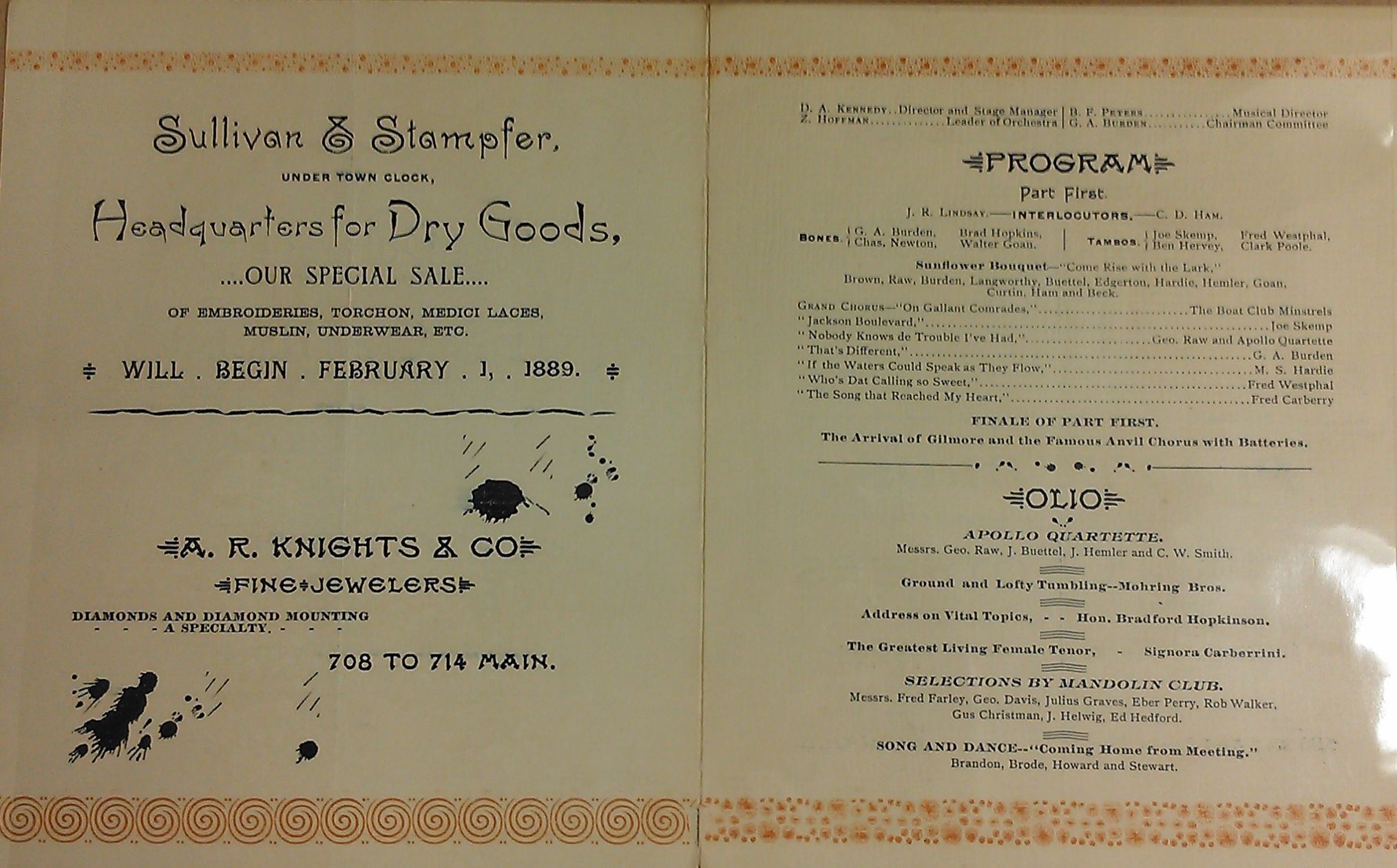Encyclopedia Dubuque
"Encyclopedia Dubuque is the online authority for all things Dubuque, written by the people who know the city best.”
Marshall Cohen—researcher and producer, CNN
Affiliated with the Local History Network of the State Historical Society of Iowa, and the Iowa Museum Association.
DUBUQUE BOATING ASSOCIATION
DUBUQUE BOATING ASSOCIATION. Articles of incorporation for the Dubuque Boating Association were signed on August 25, 1887. The signers of the articles were Joseph Morgan, C. H. McMasters, M. M. Hayden, C. N. Hooper, George F. Atkins, F. W. Langworthy and E. J. Levi. The first officers were elected to hold office in 1898. These included:
F. A. Rumpf, president
J. A. Koch, first vice president
J. F. Stampfer, treasurer
J. L. Buettell, secretary
J. R. Lindsay, captain
C. N. Hooper, first lieutenant
W. Couch, second lieutenant.
At the start the club had seventy-four active members and 180 honorary members. The membership dues were $10 annually which included the initiation fee. For a time after the organization, the club met at in the rooms of Professor Keck at Ninth and Main. Members of the executive committee continued to meet at the Board of Trade rooms.
In December 1887 the club leased a site for their club house for $100 and members loaned and contributed about $4,000 to construct and equip a building suitable for a boat club. Work on the building, 38 x 64 feet, was completed in June, 1888. The site of the building was close to the DUBUQUE WAGON BRIDGE. The first floor was used for lockers, boats and oars. The "ladies parlors" were located on the second floor along with a dance floor and lounging room. The facilities were inaugurated on July 19, 1888 with an informal party. The gentlemen were "dressed in their boating attire and the ladies followed their example and appeared dressed 'like the lass that loved a sailor lad.'"
Until 1900 boat races were one of the principal events in the Midwest. Lake Geneva in Wisconsin was the scene of four regattas and Dubuque won four different times between 1889 and 1900. Betting was common. "Pairs" and "singles" were always part of the regatta program although they were not as popular as the four-oared races. "Tip-over" canoe races, tub races, and swimming events were also popular. Winners in the different events received such prizes as fold-headed canes, silver goblets, silver smoking sets, cigars, silver sups and saucers, and even silver shaving mugs.
Several rowing stars came to Dubuque in response to the popularity of the sport. Joe Fleming, a Moline athlete, moved to Dubuque in 1889. The first boat was purchased by the club and it was used to win the district rowing championships at Cedar Rapids on July 4th. The same year the club won the state regatta in the four-oar event. In 1890 the junior four crew won their event at the state regatta. The Dubuque rowers won the 1892 four-oar event beating Burlington in a close event. In 1893 the senior doubles team won the doubles at the state regatta. In 1894 at the state races on Storm Lake the Dubuque junior four won with ease. No state races were held in 1896 or 1897, but in 1899 both the Dubuque senior and junior crews won the state regatta held at Sioux City.
In 1900 set a new state record. Ed Healy, one of the greatest rowing stars in the United States at the time, had rowed for Dubuque for ten years. In 1901 and 1902 Healy and the same crew won the state meets and in 1901 rowed into first place at the Northwestern regatta held on Lake Geneva.
Interest in competitive rowing began to decline about this time. The star four-oared crew broke up. On April 27, 1903 it was decided to dissolve the club and sell its property. The club officially ended on May 12th.
One of the club's other popular events was the annual D. B. A. minstrel show. The first of the programs was held on January 29-30, 1889. The event featuring traveling acts was continued for fifteen years.



